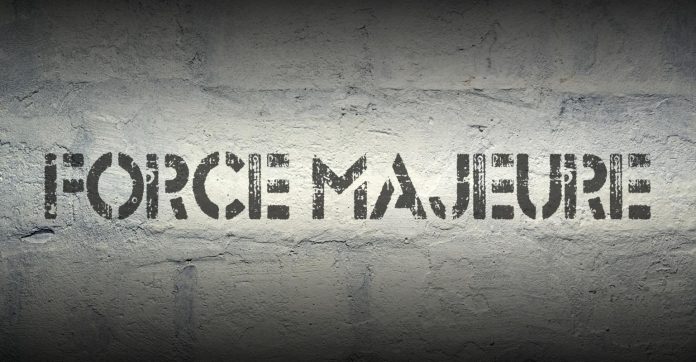This article is written by Shruti Yadav, currently pursuing an integrated BA-LL.B degree from Jagran Lakecity, Bhopal. This article talks about force majeure and what courts have had to say regarding it.
Table of Contents
Introduction
Force majeure refers to a clause incorporated in contracts to eliminate liability for natural and inescapable catastrophes that disrupt the expected course of events and restrict participants from meeting obligations. Until not so long ago, ‘Force Majeure’ was a scarcely used and primarily overlooked concept. The force majeure clause, if incorporated in an agreement, was skipped over mainly by lawyers hastening to read a contract. With all that has changed in a few months, no concept is more important now than the simple ‘Force Majeure’.
‘Force Majeure’ : an in-depth analysis
The phrase ‘Force Majeure’ has been defined as ‘an event or consequence that can neither be foreseen nor controlled. It is a contractual stipulation allocating the risk of loss if execution becomes improbable or impracticable, especially as a result of an incident that the parties could not have envisioned or controlled.’ While force majeure has neither been defined nor specifically dealt with in Indian enactments, some reference can be found in Section 32 of the Indian Contract Act, 1872 (the “Contract Act”). According to this Section, if a contract is contingent on the happening of an event that becomes impossible, the contract becomes void.
From the perspective of a contract, a force majeure clause can exempt one party from performing contractual obligations when there is a force majeure event. The force majeure clause applies to the conditions of the contract and the consequences of such force majeure events. Therefore, for the force majeure clause to apply, the occurrence of such an event must be beyond the control of both parties. Both parties will be required to prove that they have tried to mitigate the impact of such force majeure events. In the event of a situation falling within the scope of a force majeure and meeting the applicable conditions of this clause, the result will be that the parties would be exempted from performing their respective obligations under the contract if such force majeure events continue.
For other consequential liabilities, depending on the language of the clause, the party may need to issue a notice to formally hold the other party liable regarding the occurrence of such incidents and the invocation of the force majeure clause. Some contracts also contain a clause that allows the parties to terminate the contract if such force majeure events continue for a long time.
Case and fact specific
One takeaway from the way Courts have administered cases concerning the invocation of the concept of force majeure is that there cannot be a straightjacket, generic, one-size-fits-all applicability of the said concept. Each case where the said concept is solicited to be entreated would be judged on its unique fact situation to provide a finding as to whether the said law stood the attraction or not.
M/s. Halliburton Offshore Services Inc v. Vedanta Ltd & Anr, (2020)
In this case, Vedanta (the defendant) submitted an offer for the comprehensive development of three blocks (Mangala, Bhagyam and Aishwarya) in Rajasthan, and Halliburton Offshore Services (the applicant in this case) has successfully won the contract.
Under the contract, Halliburton provided various benefits, damages, and advance bank guarantees. The two parties agreed that Halliburton’s deadline to complete the work will be extended to March 31, 2020. Halliburton completed a significant portion of the project by March 31, 2020. However, due to the complete lockdown caused by COVID-19, Halliburton was unable to fulfil the contract because it requires foreign personnel and foreign workers to travel across the country everywhere.
Halliburton invoked the force majeure clause in the contract. However, Vedanta refused to accept Halliburton and instead reserved the right to take appropriate remedies under the contract, including termination of the contract and termination of balancing activities through alternative remedies. Halliburton would bear the risks and costs.
Therefore, Halliburton was forced to propose appropriate remedies to the Delhi High Court, including suspension of the invocation of bank guarantees; otherwise, these guarantees would normally be suspended by the Court on grounds of gross fraud under the law.
The High Court of Delhi, among other things, held that “the question as to whether COVID-19 would justify non-performance or breach of a contract has to be examined on the facts and circumstances of each case.” The judgment also avers that a force majeure clause has to be construed narrowly. If there is a breach before the advent of COVID-19, the party will not be authorised to take advantage of the force majeure clause.
Most present-day contracts have force majeure clauses. However, prior to COVID-19, certain clauses were used to maintain a somewhat complicated part of the contract and were rarely the centre of attention. The existence of COVID-19 has given the whole jurisprudence of force majeure a newfound pertinence. The starting days of the virus growing in different parts of the world, and the resulting lockdowns were genuinely unprecedented and unforeseeable. Moreover, these incidents transpired in a total cessation in businesses all over the globe. Almost instantaneously, there was a scrambling of legal minds in haste to comprehend how specific force majeure clauses could be invoked, what the range of security they would yield to the concerned parties, and how the losses occurring out of COVID-19 would be bartered.
When attempting to invoke and depend on force majeure clause to seek a waiver of an enforcement obligation under the contract, what has been one of the decisive factors is the preceding performance under the contract by the party soliciting to invoke force majeure to attempt discharge of a performance obligation under the contract or suspension of the same. The question remains to determine whether the violation is caused due to a party’s force majeure situation or past non-performance. In the case of the latter, the force majeure clause will not come to the rescue of the defaulting party. The general rule that arises is that if there is a prior or continuing breach by a party, then the doctrine of force majeure cannot be clasped into service to justify the same. The outcomes of the said violation would oblige the party. On the other hand, if a party can ascertain from the record that it had been constant in its performance under the contract and it is solely because of the interceding force majeure situation that the performance of the same virtually unattainable, then arguably such a party would be anticipated to accomplish in its invocation and dependence on the force majeure clause.
Existence of a real possibility to act
In order to successfully invoke this principle, it must be determined that the force majeure event makes the performance of the contract entirely or essentially impossible.
Standard Retail Pvt. Ltd v. GS Global Corp (2020)
In this case, the petitioner was a Mumbai steel company that imported materials from a South Korean company and provided a letter of credit to Wells Fargo Bank. The contract between the two companies was based on cost and freight. According to the petitioner, due to government shutdown and protection measures, the contract between the petitioner and his supplier was frustrated under the provisions of Article 56 of the Indian Contract Act, 1872. Suppliers never arrived in Mumbai. Therefore, the petitioner refused to pay. The petitioner went to the Mumbai High Court in accordance with Section 9 of the Arbitration and Conciliation Act,(1996) to prevent Wells Fargo Bank from receiving the letter of credit. The High Court of Bombay denied giving in to the petitioner’s request of restraint in the capacity of encashment of Letters of Credit. It held, among other things, that there was not an absolute impossibility to act and that the Notifications/Advisories relied upon by the learned senior counsel does insinuate that the distribution of steel has been cited as an essential service. There are no limitations on its movement and all ports and port-related activities including the transportation of vehicles and workforce, processes of container freight stations and warehouses and offices of custom house agents have also been acknowledged as essential services.
Government’s view
In consideration of the COVID-19 pandemic and consequent closure, various ministries and departments of the Indian government and various state governments issued notices/guidelines, which were regarded as conditions of force majeure and provided certain relaxations/privileges/resignation during that time. Both parties relied on these circular guidelines/warnings to determine that force majeure conditions are widespread. However, such arguments, when brought to Court, produced mixed results.
In MEP infrastructure Developers Ltd. v. SDMC & Ors, (2020) the High Court of Delhi allowed mitigation on account of the occurrence of force majeure condition and, among other things, relying on the circulars published by the government to comply as under, the respondent Corporation itself referred to Circular issued by the Ministry of Road Transport Highways (MORTH) which notified that the COVID-19 pandemic was a force majeure occurrence. Nevertheless, in Rashmi Cements Ltd v. World Metal & Alloys (FZC) & Anr(2020) the High Court of Delhi denied dependence on government circulars to, among other things. In M/s Polytech Trade Foundation v. Union of India & Ors,(2020) the Delhi High Court, while refusing the petitioner’s dependence on announcements declared by the government, held that it was evident that the circulars were in the form of advisories and not a directory in nature. Therefore the circulars did not endorse or direct respondents to not charge ground rent, penal charges/ demurrage etc. Furthermore, the letters/guidelines/advisories also could not intrude or interfere in a private contract that respondents had with their customers, i.e. petitioner. Therefore, the Court held that Government circulars/guidelines/advisories acknowledging the COVID-19 pandemic have applications where the remedy solicited is against a government entity but cannot be pushed into service against a private entity to enforce it to give up its rights resulting from a contractual agreement.
Key takeaways of the pertaining judgements
The above-mentioned judgments have given numerous indicators regarding invoking the doctrine of force majeure and serving guide for invocation of force majeure.
In a situation of attempting to invoke Force Majeure
- A connection needs to be established between violation and force majeure provisions.
- There must be an attempt to authenticate that the force majeure provision has made the execution of the contract practically impossible and not solely difficult.
- Punctual invocation acquiescence of any specific condition of application or content of invocation that the clause may mandate.
- One must seek any admission/acceptance by the opposing party of the force majeure event/condition.
In the case of soliciting to counter invocation of Force Majeure
- One must examine if it can be disputed that force majeure terms do not cover the event in the subject or that the execution was not affected by COVID-19 but a prior violation.
- One needs to interpret if the request is postulated on the mere inconvenience to perform/onerousness; mere financial non-viability has been held no ground to invoke force majeure.
- One must investigate if notice has been validly served following the contract.
- One must respond to the force majeure notice promptly.
- One must ascertain a perspective of convenience/equities in the inclination of one’s party.
Conclusion
In these unprecedented times, the applicability of force majeure cannot be interpreted as a particular case of enforcement of force majeure in all situations or contracts. Facts, circumstances, and the nature of the contract will play a key role in force majeure events and decisive factors for seeking remedies. Due to the current situation, uncertainty and anxiety have caused the parties to fire force majeure bullets desperately to evade their legal commitments. However, this misunderstanding of contract obligations and terms and attempts to use a one size fits all approach may bring significant legal risks and liabilities to the party that invokes force majeure. Since the coronavirus outbreak, the economic and logistical challenges facing the business community require all stakeholders to adopt a pragmatic approach and overcome the crisis with a certain degree of tolerance, instead of resorting to force majeure by mistake. Otherwise, although the crash may be temporary, the interruption will be permanent.
The law related to force majeure is quite mature. The law requires that when the contract itself stipulates force majeure and exemption clauses, the injured party is obliged to follow the notification procedure. While providing compensation in force majeure cases, the Court must also be within the four vertices of the contract terms. However, COVID-19 was an unprecedented event, and no one considered it when signing the contract. The suffering caused by various measures taken by the government to curb the spread of COVID-19 has affected almost every industry. However, the extent of the impact varies from industry to industry. According to the current precedents, the aforementioned abnormal situation can only occur in a series of commercial contract disputes. The Court interprets whether the contract containing the force majeure clause covers such government-imposed restrictions and blockades. However, the need now is that we need to enact written laws, rather than partial notices, to exempt affected parties from fulfilling their contractual obligations during such blockages, and such blockages should be considered force majeure. Therefore, we must enact laws related to force majeure and not merely stick to Section 32 of the Indian Contract Law or the contractual clauses.
References
- https://economictimes.indiatimes.com/small-biz/legal/force-majeure-how-successful-has-the-law-been-post-covid-in-india/articleshow/82227338.cms
- https://cfo.economictimes.indiatimes.com/news/forced-majeure-one-size-does-not-fit-all/75499566
- https://economictimes.indiatimes.com/small-biz/legal/force-majeure-how-successful-has-the-law-been-post-covid-in-india/articleshow/82227338.cms?from=mdr
- https://www.mondaq.com/india/litigation-contracts-and-force-majeure/930674/force-majeure-in-times-of-covid-19-challenges-and-the-road-ahead
- https://hallellis.co.uk/force-majeure-events-contracts/
- https://economictimes.indiatimes.com/small-biz/legal/what-is-force-majeure-the-legal-term-everyone-should-know-during-covid-19-crisis/articleshow/75152196.cms
Students of Lawsikho courses regularly produce writing assignments and work on practical exercises as a part of their coursework and develop themselves in real-life practical skills.
LawSikho has created a telegram group for exchanging legal knowledge, referrals, and various opportunities. You can click on this link and join:
https://t.me/joinchat/J_0YrBa4IBSHdpuTfQO_sA
Follow us on Instagram and subscribe to our YouTube channel for more amazing legal content.
 Serato DJ Crack 2025Serato DJ PRO Crack
Serato DJ Crack 2025Serato DJ PRO Crack










 Allow notifications
Allow notifications


